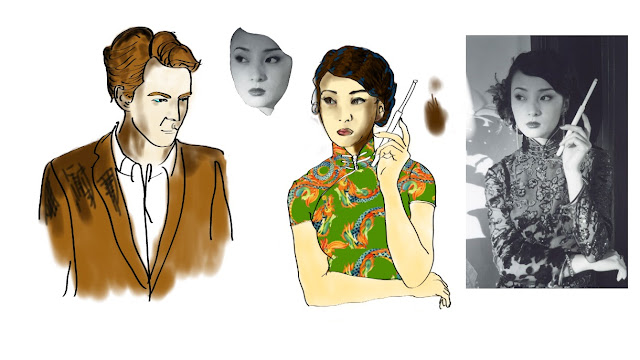 |
| Sketch of Tita Pasang flying from the book trailer to Trixi Pudong and the Greater World. |
I have a personal philosophy about work. I believe in grit, defined in Webster's as "firmness of mind and spirit: unyielding courage in the face of hardship or danger." When you're an artist, the hardship or danger is the lack of motivation or inspiration. Or the loss of your will to go on in the face of harsh criticism.
I use grit to overcome these feelings. But what exactly does grit feel like? Let me share my experience with you. It might be different from what you feel.
I come from a driven and inspired family. My father has been a passionate scientist all his life, landing his first "job" as professor at the University of California in Berkeley when he was just in his mid 30s. My mother is a gritty person, she is generally extreme in all things she does. Growing up in a household like this, my sister and I learned to never feel okay relaxing and splashing in the swimming pool in the summer unless all the work was done. We grew up with inner voices hounding us that we were being lazy and that there was so much work to get done.
It wasn't healthy. In fact, I had to go through some therapy to get rid of these voices. It wasn't until I was 23 years old, living in Helsinki ⎯ thousands of miles away from either parent ⎯ that I realized that I could wake up in the morning in total peace and relaxation, before I had gotten anything done.
 |
| Sketches of Mr. Prowd and Ahn Na from the book trailer to Trixi Pudong and the Greater World. |
And having pushed, whipped, and gritted myself through a double-degree program in music and science plus a side of pre-med, I saw my limits up close while preparing my senior recital while studying for the MCAT and applying for a Fulbright, which I won and used as my free ticket to re-boot my life in Europe.
You know you're pushing yourself to your limits when you ask yourself "Why am I doing this?" for a long time. Because that tells you that you've gone beyond your comfort zone and are plugging away on pure good faith that something just has to come out of it.
You know you've pushed yourself when you know what a coffee hangover feels like: leg cramps, headache, and dehydration ⎯ but all without the partying.
You know you've gritted through the hard parts when you look back at your progress from one year ago and remember how scared, humiliated, and ashamed you felt when people gave you feedback or criticism of your work, you wanted to cry and throw it all away... yet you kept going.
See how that feels?
At the same time, there is the danger of exhaustion. And the danger of becoming one of those hyperactive people who WRITE ALL THEIR EMAILS IN CAPITAL LETTERS, relentlessly self-promote, and fail to take reflective breaks. These states of mind -- exhaustion and indiscriminate action -- produce poor quality work because in these states, you've lost track of your internal compass.
That's why we have to turn to the lesser known side of the Grit process: Surrender. As in turning off your mind at night when you just can't work anymore, not feeling frustrated when you can't work because of kids or your day job, and even planning time in your project to let go and surrender the process to a greater power.
In letting go, you let the faster part of your brain take over and solve the problems that your slow brain can't chew through. Like a dog who catches a frisbee mid-air without thinking about it, your brain has the capacity to solve stubborn problems like writer's block if you just let it stop thinking. I find letting go to be just as important as pushing myself to consciously get work done.
So that's my recipe for getting difficult things done:
Push yourself.
Work as hard as you can.
And surrender.

No comments:
Post a Comment